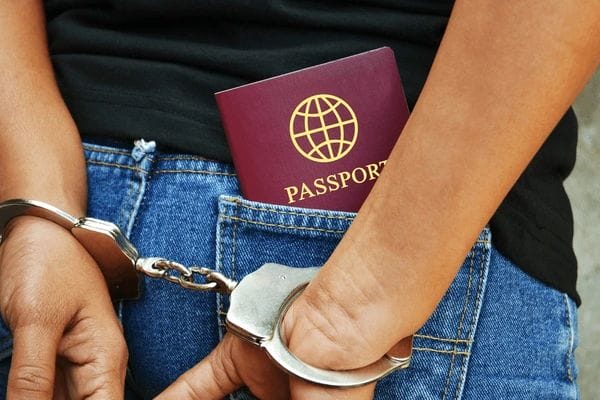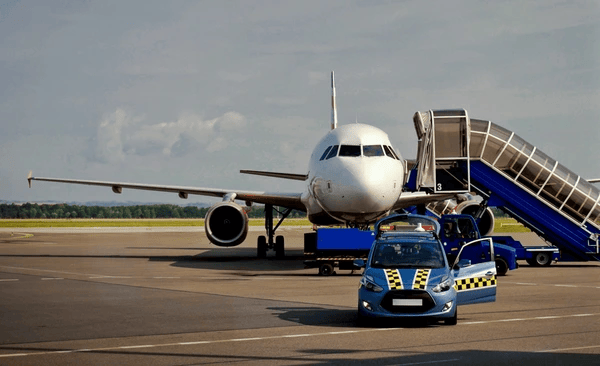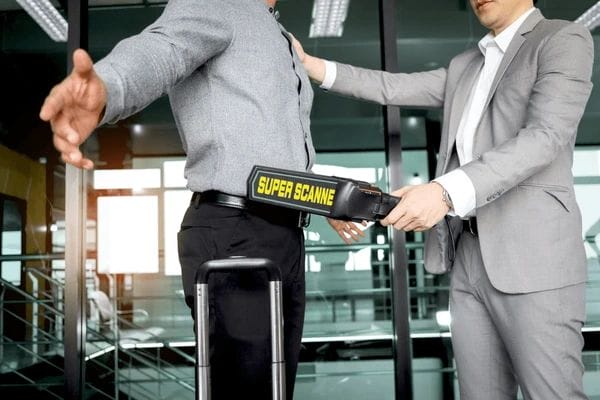
In 2024 I was on a flight from Atlanta to Houston. And once we deplaned there were about six (6) local police officers waiting at the gate. Being nosey, I lingered a bit and saw they were waiting for an unassuming young man (looked to be in early 20s) and they surrounded him. Nothing was combative. But, of course a scene was made because there were a gaggle of police surrounding the young man who just got off the plane.
I took a deep sigh as I felt bad for him; while also curious about what he had done. My travel partner said “He likely had a warrant. What a dumb move. Because everybody knows that is the first place law enforcement look – the travel logs.”
Having an outstanding warrant is a serious matter, and it might leave you questioning if air travel is even an option. Whether it’s a bench warrant or something more severe, the thought of boarding a plane with a warrant can feel overwhelming and uncertain.
Airports and security systems are complex, and not every warrant is treated the same. Some people manage to fly without issue, while others face serious consequences. This post will guide you through the nuances of air travel with a warrant, so you can make informed decisions.
Key Takeaways
- Flying domestically with an active warrant is possible but risky, as detection could lead to arrest at the airport or upon arrival.
- Outstanding warrants complicate international travel due to rigorous background checks by customs, which may result in denial of entry, boarding, or extradition.
- Arrest warrants, bench warrants for missed court appearances, and federal warrants can all impact travel, with federal warrants posing the highest risks, including passport revocation.
- Being caught at the airport with an active warrant may lead to arrest, detention, legal action, and extradition, depending on the warrant’s severity.
- Consulting a lawyer and resolving warrants before travel is essential to avoid disruptions and legal complications.
Types of Warrants That May Impact Air Travel

Warrants come in different types. Some impact air travel more than others. Even a minor offense might restrict your movement across borders.
Arrest Warrant
An arrest warrant is issued when law enforcement has sufficient evidence to believe you’ve committed a crime. This type of warrant authorizes police to arrest you at any time. When it comes to flying, an arrest warrant is one of the most serious issues you could face. TSA checks don’t actively search for warrants during routine screenings, but if your ID is flagged in a law enforcement database, you could be detained. This risk is especially high if the warrant involves a felony or violent crime. For example, even a traffic stop at an airport security checkpoint could escalate if your name matches an active arrest warrant.
Bench Warrant
A bench warrant, on the other hand, is often issued for procedural reasons, such as missing a court date, failing to pay a fine, or ignoring a subpoena. While bench warrants are generally considered less severe than arrest warrants, they shouldn’t be taken lightly. Bench warrants may be lower risk but could still cause issues depending on the jurisdiction and type of offense (e.g., unpaid fines vs. child support enforcement). They’re usually tied to local or state systems, so the risk of being flagged depends on where you’re traveling. For instance, flying within the same state where the warrant was issued increases the likelihood of detection. Bench warrants might not always trigger federal alerts, but if they’re tied to more serious matters like child support enforcement or unpaid tickets, the risks rise significantly.
Federal Warrant
A federal warrant is issued for crimes under federal jurisdiction, such as tax evasion, large-scale drug offenses, or fraud. These warrants are part of national databases, making them the most likely to be detected during air travel. Federal warrants are linked to national databases, making them highly likely to be detected during TSA checks or customs screenings. Unlike bench or state-level arrest warrants, federal warrants carry heavier penalties, and traveling with one poses a substantial risk. For instance, attempting to leave the country with a federal warrant is almost guaranteed to alert authorities at customs, leading to arrest.
Domestic Flights and Warrants

When it comes to domestic flights and warrants, things can get tricky. You may face scrutiny from the TSA (Transportation Security Administration) during security checks and database screenings. The type of warrant you have could determine if you’ll be allowed to board the plane or not. Now while not all local law enforcement actively monitors airport travel logs for warrants, law enforcement presence at airports may lead to detection if flagged.
TSA Security Checks
TSA security procedures are designed to detect threats, not to enforce warrants. However, these checks can indirectly lead to complications if your driver’s license or us passport is flagged. While TSA does not specifically check for warrants during screenings, it does work with databases that may indirectly flag warrants during ID verification.
If a background check reveals an existing warrant, you could be detained on the spot, depending on the specific circumstances and the different state where the warrant is active. Airport officials may escalate the situation by contacting police officers or peace officers at the scene. Resolving warrants before traveling is the best thing to avoid unnecessary risks.
Database and Background Checks
When flying, you face database and background checks. The TSA’s Secure Flight Program verifies identities against secure databases. This does not include arrest warrants. However, federal warrants are checked against national databases – potentially leading to arrest.
Airport security may also conduct background checks, revealing outstanding warrants. So be aware – flying with an active warrant carries risks of detection and potential legal consequences upon arrival. Consult a lawyer if you have concerns about outstanding warrants before traveling by air.
International Flights and Warrants

International travel with outstanding warrants can be a complex issue involving passport restrictions, customs, and immigration checks.
Passport Restrictions
You may face passport restrictions if you have an outstanding warrant. Federal arrest warrants often lead to passport revocations. Certain crimes like drug trafficking can prevent you from obtaining a passport for international travel.
When applying for a new passport, you must attest to having no pending warrants on Form DS-11. Providing false information could result in criminal charges. So, it’s crucial to resolve any outstanding warrants before applying for or renewing your passport.
Customs and Immigration Checks
Customs and immigration checks pose significant risks when traveling with an outstanding warrant. If you’re flying internationally, you’ll face additional scrutiny at your destination’s airport. Customs and border officials often have access to law enforcement databases and can detain travelers with active warrants, especially for serious crimes. They’ll likely discover any active warrants during routine checks.
Upon arrival, you may be detained and arrested by local authorities. Extradition to face charges is a real possibility, especially with felony warrants. Even misdemeanors could lead to complications at the border. Customs views attempts to flee jurisdictions as a willful disregard for the legal process. You’ll be treated as a high-risk traveler trying to evade justice.
Risks of Flying With a Warrant

You face a higher chance of detection at security checkpoints if you have an active warrant. Airport security conducts thorough ID checks and database searches. Major airports have a strong police presence too.
Law enforcement may intervene if your name triggers an alert during screening. Even for a minor offense, officers could take you into custody right there. Clearing up warrants beforehand prevents complications and arrests at the airport.
Entities from Concepts related to “Detection at Security Checkpoints”:
- ID verification
- Database checks
- Police presence
- Security screening
- Arrest at airport
Entities from Tools related to “Detection at Security Checkpoints”:
- No-fly list
- Warrant databases
- Airport security checkpoints
- Full-body scanners
- Passenger identification systems
Remember arrest, detention, or denial of boarding are potential outcomes if a warrant is flagged during ID verification or background checks.
Potential Consequences
Traveling with an active warrant can result in serious outcomes that may escalate your legal troubles. Here are the main risks you face:
- Arrest at the Airport or Upon Landing: If your warrant is flagged during TSA checks, law enforcement can arrest you immediately. This is particularly likely for serious offenses like felonies or federal crimes, as they are linked to national databases.
- Denial of Boarding or Detainment: Even if you aren’t arrested, authorities may prevent you from boarding the plane. You could be detained for questioning, delaying or canceling your travel plans entirely.
- Worsened Legal Consequences: Ignoring a warrant and attempting to travel might lead to additional charges, higher bail, or stricter penalties. Courts could view your actions as evasion, making your legal situation more complicated.
Tips for Addressing an Outstanding Warrant Before Traveling
Consulting a criminal defense attorney is crucial if you have an outstanding warrant. A lawyer can explain your rights and options regarding the warrant. They’ll provide tailored legal advice to mitigate risks of traveling. An attorney helps prepare you for potential court appearances or legal proceedings. They ensure you understand the consequences of the warrant. Their guidance is invaluable for addressing warrants before flights.
Resolving an outstanding warrant before flying is crucial. You’ll want to consult a lawyer to understand your options and the warrant’s jurisdiction. Turning yourself in or posting bail may be necessary to get the warrant lifted.
Addressing it proactively prevents complications at airport security checkpoints or upon arrival at your destination. Failing to resolve the warrant could lead to detention by police or immigration authorities. Even if you make it through initial screening, the warrant remains in databases. Your travel plans face major disruptions if you’re arrested at your destination.
Final Thoughts
You face risks when flying with an outstanding warrant. Arrest at security checkpoints or upon arrival is possible. Traveling with an active warrant is a high-risk decision that depends on various factors, including the type of warrant, its severity, and how it intersects with airport security systems. While some individuals manage to travel without issue, the potential consequences—ranging from detainment to arrest—make it a gamble. Resolving the matter proactively is the most reliable way to ensure a smoother outcome.
Frequently Asked Questions
1. Can you board a plane with an active warrant?
It’s possible to board a plane with a warrant, especially for minor offenses, but there’s always a risk of detection during TSA screenings or ID verification.
2. Does TSA check for warrants during domestic flights?
TSA’s primary focus is on security threats, not warrants. However, your warrant could be flagged if it’s linked to federal or state databases during ID verification.
3. Will I be arrested at the airport if I have a warrant?
If your warrant is detected, law enforcement may arrest you immediately. This is more likely for serious warrants or if authorities are monitoring your location.
4. Can you fly internationally with a warrant?
Flying internationally with a warrant is much riskier. Customs and border officials often check for active warrants, especially if they involve serious crimes or federal charges.
5. How can I check if I have a warrant before traveling?
You can search online warrant databases, contact local law enforcement, or consult an attorney to verify if you have an active warrant.
6. What happens if I’m flagged at the airport?
You may be detained, denied boarding, or arrested, depending on the warrant’s severity and jurisdiction.
7. Should I resolve the warrant before traveling?
Yes, resolving the warrant through legal channels before traveling is the safest way to avoid complications, detentions, or further legal consequences.
8. Are there alternatives to flying with a warrant?
Consider alternative transportation methods, such as driving or taking a bus, as they often involve less stringent ID checks than air travel.

